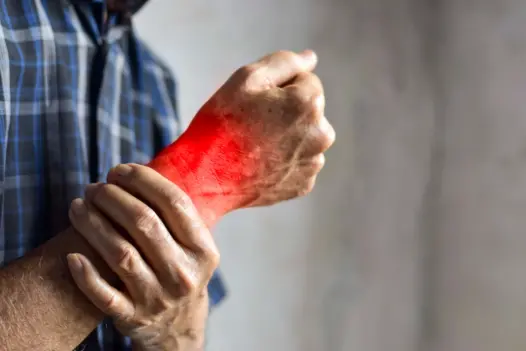Complex Regional Pain Syndrome (CRPS) can lead to severe, long-lasting pain and sensitivity. A cannabis prescription for CRPS may offer patients much-needed relief, as cannabis has been shown to reduce pain and inflammation. The calming effects of cannabis may also ease anxiety and improve sleep, helping patients manage both physical and emotional symptoms associated with CRPS.
Complex Regional Pain Syndrome: What is it?
Complex Regional Pain Syndrome (CRPS) is a form of persistent pain that arises following an injury. and is more intense and persistent than one may anticipate after a similar accident. The majority of CRPS patients follow arm or leg injuries.
What are its Causes?
Incidents that result in injuries, such as fractures, infections, and more, can result in complex regional pain syndrome. CRPS is more likely to manifest in injuries that are more serious. It can also be brought on by less serious wounds, such as sprains and soft-tissue injuries. A higher risk of developing complicated regional pain syndrome is also linked to immobilisation after injury.
Symptoms of CRPS
There are a few typical CRPS indications and symptoms, and some patients may find it difficult to move about because of the pain.
- Chronic pain
- Sensitive skin
- Limb swelling
- Changes in the affected area’s temperature
- Excessive swelling
- Alterations in the afflicted area’s skin, hair, and nails
- Weakness
What are Complex Regional Pain Syndrome’s Three Stages?
The three clinical phases of complicated regional pain syndrome are as follows:
- Stage 1 – Acute, and lasts for one to three months.
- Stage 2 – Subacute, often lasts three to six months.
- Stage 3 – Chronic, long-lasting modifications to the afflicted region
Treatment for Complex Regional Pain Syndrome
There are four primary treatment focuses for complicated regional pain syndrome:
- Self-management and education (coaching and guidance on how to control the disease)
- Physical therapy (which helps reduce the likelihood of long-term problems and improves physical functioning)
- Pain treatment (medication to aid with pain reduction, or specialised options like medical marijuana)
- Psychological support (assistance in coping with the psychological effects of having the illness)
Cannabis and Marijuana for Medical Use to Treat Complex Regional Pain Syndrome
There hasn’t been much investigation into how medical cannabis affects CRPS. Since medicinal cannabis became legal in 2018, the demand for its use has increased. If conventional treatments for CRPS symptoms are ineffective, medicinal cannabis may be used as an alternative.
Private Consultation for Medical Cannabis Prescription
At MARUCANNA, we simplify the private cannabis consultation process. Begin with a free eligibility check, then complete a short questionnaire for an instant decision. Eligible patients will have a virtual consultation with our medical team.
